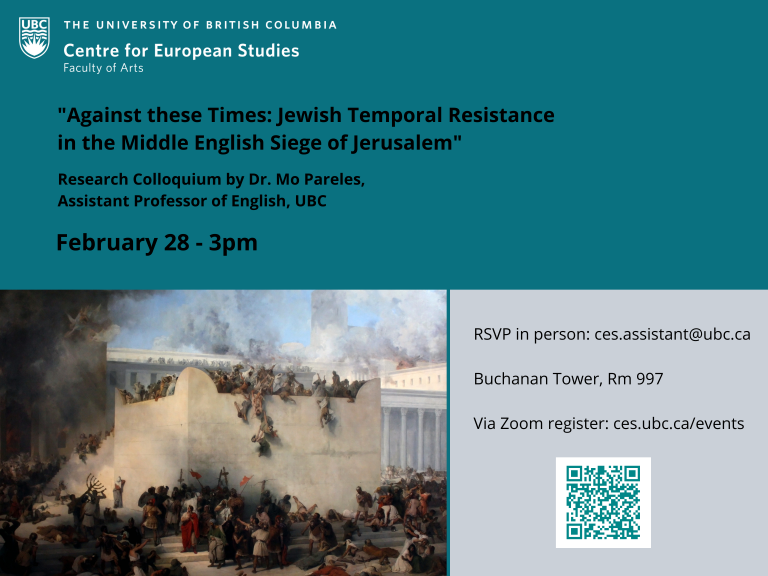Event Postponed
“Against these Times: Jewish Temporal Resistance in the Middle English Siege of Jerusalem” Research Colloquium
Abstract:
The alliterative Middle English Siege of Jerusalem poem elaborates upon a legendary episode well-known to readers of Josephus and other versions of the siege: that of the Jewish Mary who cooks and eats her own baby. While this scene is sometimes read as a Eucharistic inversion, it also represents a shocking expression of anti-futurity—of destruction and consumption of the Jewish future. In the Middle English iteration, the Jewish witnesses of Mary’s crime cry out: “Alas, how long must we remain in this life? It would be better to die in battle at a single stroke than to live in misery and prolong our end, (Alas! In this lif how longe schul we dwelle?/ Yit beter were at o brayde in batail to deye/ Than thus in langur to lyve and lengthen our fyne). The sentiment, which in Josephus and other sources originates in Mary as justification for her crime, here suggests a communal anti-futurity, a refusal of the unendurable Jewish future prescribed by Christian supersession, that both amplifies and responds in horror to infant sacrifice.
In queer studies, “anti-futurity” indicates antagonism to hegemonic reproductive time. In the Siege, a poem that explicitly depicts Incarnational temporality and normative imperial time overcoming the Jewish sacred calendar, it describes a form of Jewish temporal resistance. This essay, part of a larger project linking Jewish, animal, and infant temporalities in the medieval Christian English imagination, argues that the Siege of Jerusalem presents an asymmetrical struggle between Jews and Christians over temporal frames, revealing Incarnational time as an unbearably open future subjecting Jews to endlessly creative forms of harm, while linking Jewish refusal to the non-linear temporalities not only of the Jewish calendar but also of maternal, infant, and bestial bodies.
Bio:
Dr. Pareles is a medievalist and assistant professor of English at UBC. Their first book, “Nothing Pure: Jewish Law, Christian Supersession, and Bible Translation in Old English” (forthcoming from University of Toronto Press) traces the supersessionary Christian translation of the Hebrew Bible in Old English. Their second book project, tentatively titled “Time’s Others: Infant, Animal, and Jewish Temporalities in Medieval Christianity“, explores the abjected, arrested, and pregnant temporalities that make medieval Christian futures possible.

